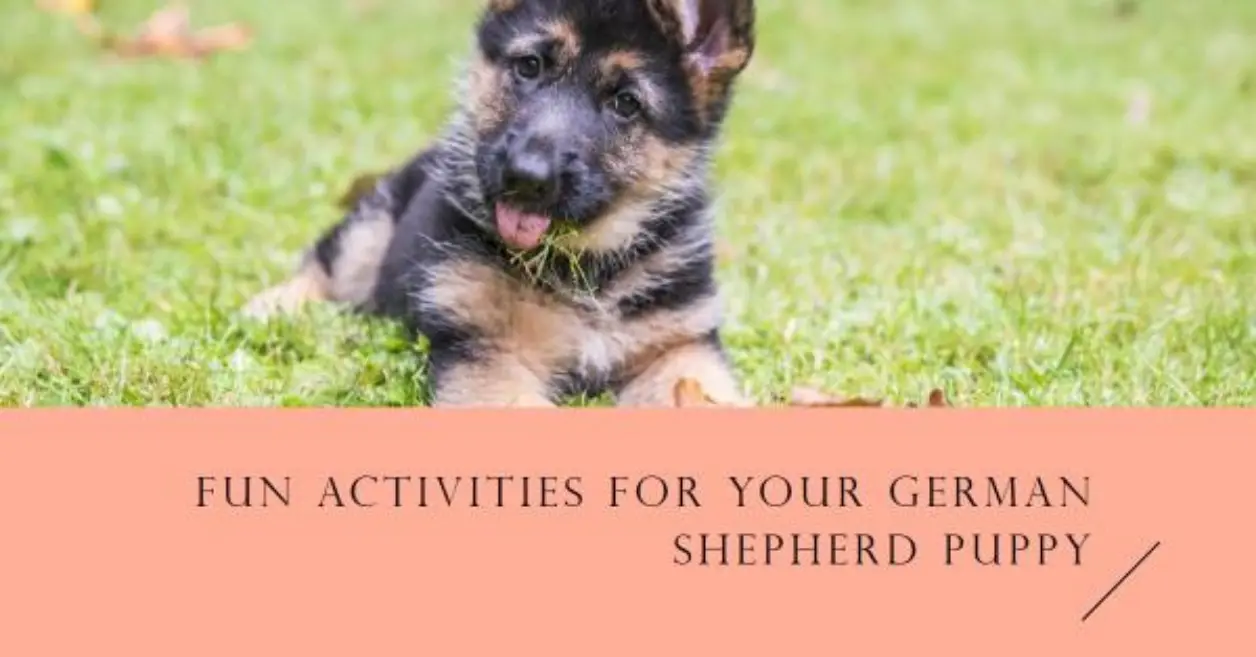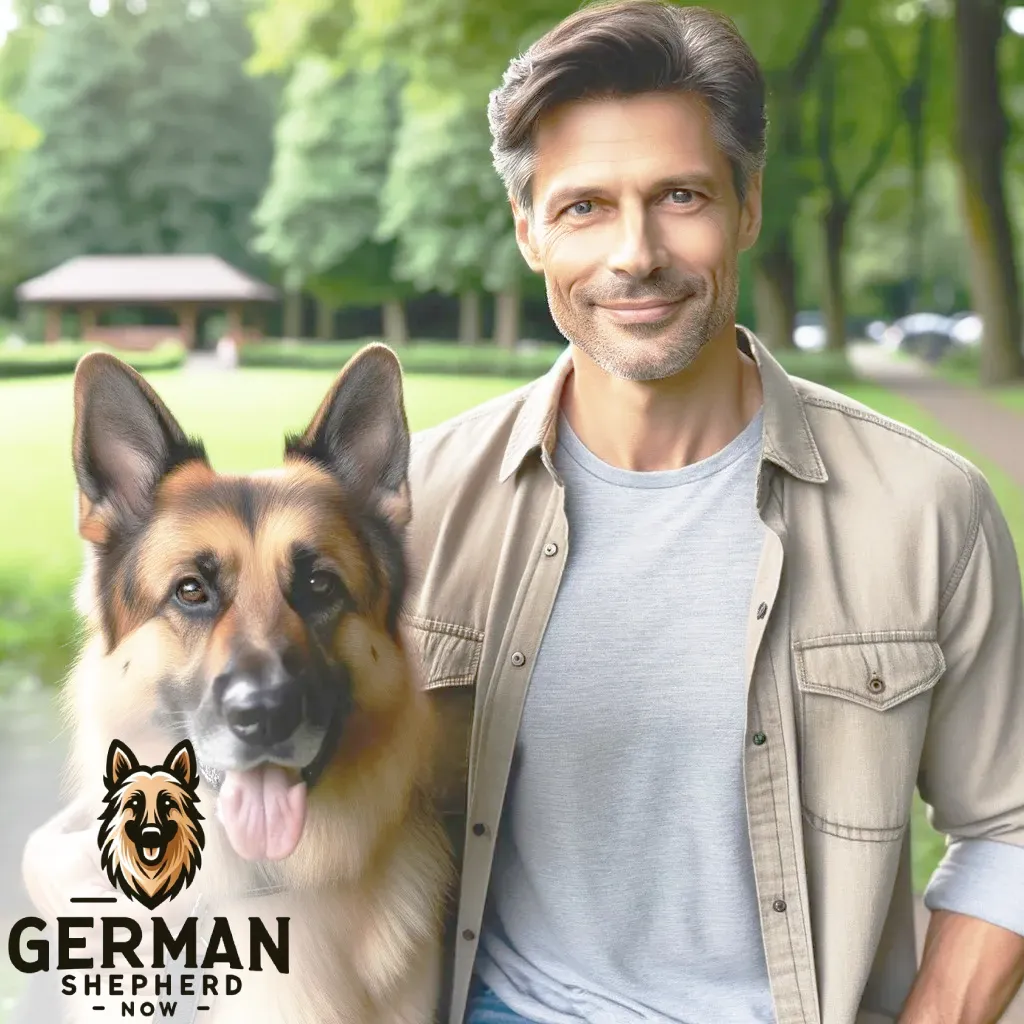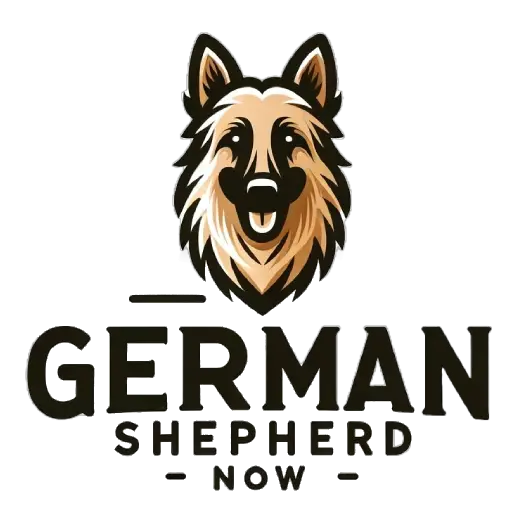How to Keep a German Shepherd Puppy Busy

To keep a German Shepherd puppy busy, provide a mix of physical exercises like walks and play, along with mental stimulation through training sessions and puzzle toys.
Consistently engage them in socialization activities and give them simple jobs, ensuring they get around 90 minutes of exercise daily.
German Shepherd puppies are bursting with energy and intelligence.
Within the first few months of life, German Shepherd puppies need encouragement to develop good habits and skills for the future.
| Activity Type | Specific Activities | Benefits & Tips |
| Exercise | – Daily walks (10-60+ minutes) | – Builds physical stamina; starts short and increases over time. |
| – Play fetch | – Engages natural drives; use a variety of toys. Be cautious of joint health. | |
| – Off-leash play | – Allows freedom of movement; always supervise in secure areas. | |
| – Swimming | – Excellent low-impact exercise; introduce to water gradually. | |
| – Dog sports (agility, rally, etc.) | – Foster’s athleticism and focus; keep training sessions short and positive. | |
| Mental | – Short, frequent training sessions | – Teaches obedience and skills; maintains a positive atmosphere. |
| Stimulation | – Puzzle toys | – Encourages problem-solving; vary toys to keep it engaging. |
| – Obedience classes | – Offers socialization and mental challenges; reinforces focus on the owner. | |
| – Search games | – Enhances scent and search skills; increases difficulty over time. | |
| – Chew toys | – Satisfies chewing instinct; provides a variety of textures and supervises. | |
| Socialization | – Puppy classes | – Controlled environment for meeting new dogs and people; encouraged good behavior. |
| – Exposure to new settings | – Expands comfort zone with different environments; monitor all interactions. | |
| – Car rides | – Prevents travel anxiety; makes car rides a routine. | |
| – Exposure to different sounds/textures | – Desensitizes to various stimuli; uses recordings and diverse physical environments. | |
| Providing Jobs | – Basic Obedience | – Reinforces training; integrates cues into daily routines like mealtime. |
| – Carrying toys | – Gives a sense of purpose; use it to help on walks or outings. | |
| – Fetching items | – Develop retrieval skills; start with simple items and advance to more complex tasks. | |
| – Tug games | – Fulfills natural drive; establishes control with release commands. |
Exercise – A Tired Puppy is a Good Puppy
As a naturally athletic working breed, German Shepherds require a lot of physical activity starting early in life.
Exercise is one of the most effective ways to keep a German Shepherd puppy busy.
Daily Walks
Frequent short walks are ideal for young German Shepherd puppies.
Start with 10-15 minute walks and gradually increase to 30-60+ minutes as your puppy ages. Bring toys to engage your puppy so they don’t get bored.
Play Fetch
Chasing and retrieving toys allows your German Shepherd puppy to burn off their energy.
Try different types of balls and flying discs to see what engages your puppy’s natural herding and prey drive.
Avoid strenuous repetitive motions that could damage growing bones and joints.
Off-Leash Play
When possible, give your German Shepherd puppy time for off-leash play in a securely fenced area.
This allows them to really run at their own pace and play freely. Always supervise off-leash time.
Swimming
Swimming is a fantastic, low-impact exercise for German Shepherd puppies once they learn to enjoy the water.
Not all dogs take to swimming naturally, so introduce pools and ponds slowly. Offer rewards for any water interaction.
Dog Sports
Get a head start training your German Shepherd puppy for dog sports like agility, rally, and obedience.
Positive introductory courses build their athleticism, focus, and bond with you. Always keep sessions short and success-focused at this age.
Mental Stimulation – A Working Brain Prevents Boredom
Mental stimulation is equally as important as physical exercise for German Shepherd puppies.
Their naturally high intelligence and eagerness to work make them prone to boredom. Providing mental challenges prevents destructive behaviors.
Training Sessions
Frequent short training sessions teach critical skills while tiring your German Shepherd puppy’s brain.
Keep lessons upbeat. Practice basic cues like sit, stay, down, come, heel, and leave.
Puzzle Toys
Introduce puzzle toys and feeders designed to challenge your puppy’s problem-solving skills.
As they work at moving the toy in different ways to get treats out, their mind stays engaged.
Obedience Classes
Early socialization and training classes provide mental stimulation as your German Shepherd puppy focuses on you amid distractions.
Learning new skills in a group environment engages their mind.
Search Games
Hide treats, toys, or yourself around the house and yard, and encourage your puppy to hunt them out.
Start easy and advance to more challenging spots to improve their scent and search skills.
Chew Toys
Provide an array of chew toys offering different textures, shapes, and materials to appeal to your puppy’s preferences. Vary the selection to keep it interesting.
Supervise chew time to prevent swallowed pieces.
Socialization – Exposure to New Things
Positive exposure to new people, animals, places, sights, and sounds is essential to raising a well-socialized German Shepherd.
Socialization prevents wariness when introduced to novel stimuli as an adult.
Puppy Classes
Controlled interaction with unfamiliar dogs and people in puppy classes makes socialization safe and enjoyable. Reward calm greetings and play.
New Settings
Bring your German Shepherd puppy to experience new environments like pet stores, parks, and hiking trails.
Let them explore while supervising any interactions with strangers.
Car Rides
Take your puppy on frequent short car rides to run errands and visit new neighborhoods. This prevents car sickness and makes travel easier as they grow.
Sounds & Textures
Play recordings of sounds like sirens, horns, and thunder to desensitize your pup.
Let them walk on various surfaces like wood, tile, gravel, grass, and carpet for texture exposure.
Providing Jobs – Channel Energy into Work
Thanks to their strong work ethic and aim to please, German Shepherds thrive when given jobs to focus their efforts on. This provides an essential outlet for both mental and physical energy.
Basic Obedience
Reinforce training essentials like sit, down, stay, and heel by having your puppy demonstrate these cues before getting dinner, treats, or play. Reward them for working for you.
Carrying Toys
Teach your puppy to carry objects like their leash or a toy bag. This gives them a job to do on walks or trips to the park to exert pent-up energy.
Fetching Items
Have your puppy fetch slippers, the newspaper, or named toys to work on retrieving skills. Gradually train them to perform more complex retrieval tasks.
Tug Games
Play controlled tug games using designated tug toys. Letting your puppy tug develops confidence and an outlet for their drive.
Teach them to release the toy on command.
Giving your German Shepherd puppy daily physical exercise, mental stimulation, socialization, and training prevents problem behaviors caused by pent-up energy and boredom.
While individual dog’s needs vary, most German Shepherd puppies require about 90 minutes of daily activity in addition to training and playtime to stay occupied.
A blend of walks, play, training games, social experiences, puzzle toys, and jobs engages your puppy’s body and mind for a well-adjusted companion.
The Finish Line: Puppy’s Needs from Start to Finish
The Working Dog Finish Line: Keeping Your GSD Puppy’s Tank Full Raising a German Shepherd puppy is a full-time job: their high energy levels and intelligence demand constant stimulation to avoid boredom and destruction.
Physical exercise, mental challenges, socialization, and providing jobs are crucial to keeping your German Shepherd puppy fully occupied.
While it requires diligent effort during puppyhood, the investment pays off with a confident, well-trained German Shepherd ready to be your loyal companion for years.

I’m Martin, and I grew up in the super cool city of Seattle. You know, the place with all the incredible mountains and forests? Yeah, that’s my playground!
Ever since I was little, I’ve been all about nature. I used to wander around the woods with a notebook, doodling all the cool plants and animals I’d find.
